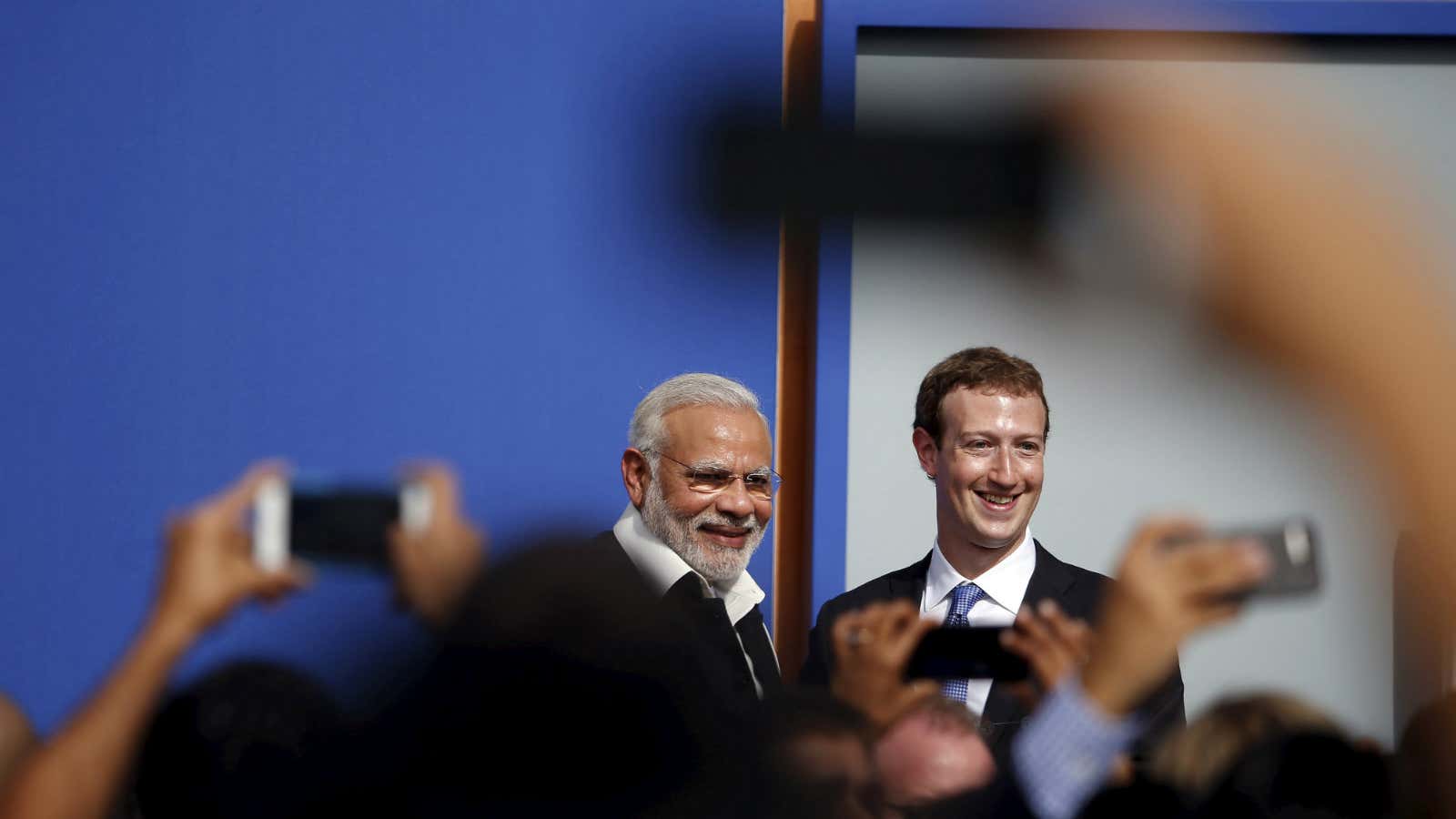The leader of the world’s largest democracy and the founder of one of the world’s most influential technology companies sat down for a public chat—and it turned out to be a spectacular letdown.
Almost everything in the 50-minute-long chat between Narendra Modi and Mark Zuckerberg reeked of PR-scented hot air.
True, the two hadn’t really defined much of an agenda for the meeting. In a Facebook post announcing Modi’s visit to Facebook HQ, Zuckerberg had written that they’d “discuss how communities can work together to address social and economic challenges.”
The questions from Zuckerberg and the rest were mostly unimaginative and failed to press Modi on key issues including India’s internet regulatory framework and concerns over freedom of expression.
Modi’s answers—almost entirely in Hindi—heavily featured his rhetoric-infused routine, save for the end when the Indian prime minister choked up recalling his childhood and family.
Amid chants of “Modi, Modi,” Zuckerberg began with a revelation: On the suggestion of Apple’s Steve Jobs, he had traveled to a temple in India as he sought to focus Facebook’s mission in the early days of the social network’s life.
Of course, that was the perfect foundation for Modi to indulge in some back-slapping before launching into an assorted list of India’s exploits (and dreams) under his watch.
Zuckerberg followed by asking Modi if he’d foreseen social media’s rise as a tool for governance, citizen engagement, and diplomacy. It was made to measure for the prime minister, a social media superstar.
The first question from the audience furthered the stilted nature of the session.
Vir Kashyap, the co-founder of job search website Babajob.com, asked Modi about his government’s investments in internet in India. Babajob is an Internet.org partner in India, and Quartz had earlier questioned why this tiny search portal was chosen to be featured on Internet.org and not the industry leader Naukri.
In India, several net neutrality crusaders have argued that Internet.org—a free, limited internet for the subscribers of Reliance communications—violates the open nature of the web. Facebook supporters, on the other hand, say that providing internet to billions of deprived Indians is more important than “righteous objections.”
There was no mention of this contentious debate during the town hall.
The rest of the audience also kept the questions relatively safe and generic. A Facebook employee asked if it has become easier to do business in India since Modi became the prime minister.
“It is easy to turn a scooter, but not a train with 40 bogeys. This is such a big country, changes are constant and widespread,” Modi said.
He then mentioned the success of his banking scheme, Jan Dhan Yojna. The scheme aims to provide every household in India with a bank account. “My government created 180 million bank accounts in 100 days. This is the speed of change,” Modi added.
However, as of Sept. 16, 77 million of the 183 million bank accounts had zero balance.
Ranjana Kumari, director of Centre for Social Research, a not-for-profit organization on gender rights in India, asked Modi about his stand on women’s empowerment.
“If we want to achieve our economic goals, then we cannot do that if we imprison 50% of our population inside their homes,” he replied.
Modi also talked about the success of his government’s promoting education among women in India.
The last question, fittingly, came from Zuckerberg himself: “I understand that your mother is very important in your life, so I’m hoping you’ll tell us a little more about her.”
A smiling Modi started by calling out Zuckerberg’s own parents in the audience. Then, he began describing his well-known personal story of a tea seller rising to become a prime minister.
Remembering his late father, Modi choked up slightly. After a long pause, he spoke about his mother.
“When we were small, to make a living, in the nearby houses,” Modi said, his robust voice reducing to a squeal, and almost breaking into tears, “we would clean dishes, fill the water, do hard chores.”
“So you can imagine what a mother had to do to raise her children,” he added, getting a hold over his emotions.
Swiftly, though, the prime minister added that this wasn’t just the “case with Narendra Modi. Hundreds and thousands of Indian mothers made similar sacrifices.” A standing ovation followed.
The Indian prime minister’s meeting with Facebook’s founder was all about Narendra Modi.
(Manu Balachandran, Madhura Karnik and Itika Sharma Punit contributed reporting.)
We welcome your comments at ideas.india@qz.com.
